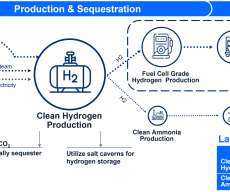Bakken Energy, Cummins and Schneider partner on design of the Heartland Hydrogen Hub for long-haul trucking
Green Car Congress
OCTOBER 25, 2022
In conjunction with the States of North Dakota, Minnesota, Wisconsin and Montana, Bakken Energy is working on the design of the Heartland Hydrogen Hub, a regional clean hydrogen hub recently announced by North Dakota Governor Doug Burgum. and Schneider National Carriers Inc.,





























Let's personalize your content